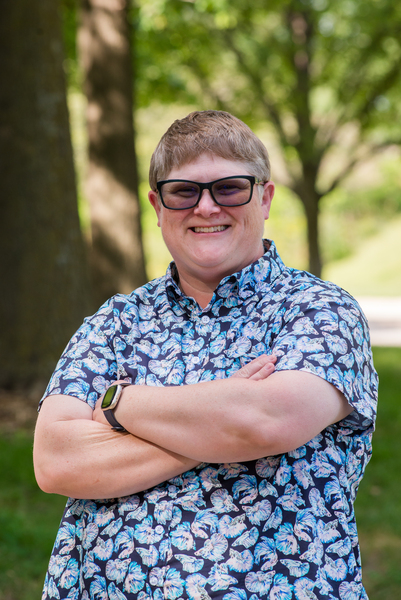


I’ve lived in Coralville with my family since 2014. I spent 18 years as an engineer in the aerospace and medical device industries, focusing on quality and process improvement. In 2022, I decided to follow a long-held dream of becoming a furniture designer and went back to school, earning my MFA in 3D Design from the University of Iowa this past May. My MFA work focused on designing for sensory needs in adults, creating furniture and objects that are functional and aesthetically thoughtful while reducing sensory overload.
Since 2017, I’ve run my woodworking business, Freeman Furnishings, teaching classes locally and nationally, sharing my process, and creating content about my work. I also hosted a podcast for five years highlighting the voices of women, nonbinary, and transgender artists and craftspeople—amplifying stories that are too often overlooked.
Throughout my life, I’ve led by listening first. This approach shapes everything I do, from my creative work to my community engagement. I’m deeply committed to uplifting voices that have been ignored or left out of important conversations and bringing those perspectives into spaces where decisions are made.
If elected, my top three priorities on the Coralville City Council would be:
1. Building a More Inclusive and Community-Driven Government.
Coralville’s strength lies in its diversity, and our city government must reflect and respond to the needs of all residents. I will prioritize creating intentional opportunities for community input, ensuring that residents—especially those whose voices have historically been marginalized—are included in decision-making processes. This means meeting people where they are, listening to lived experiences, and shaping policy with, not just for, our community.
2. Protecting and Uplifting Vulnerable Communities.
In this moment, many of our residents—immigrants, BIPOC communities, and queer and trans individuals—are being targeted by harmful state and federal policies. As a city, we must take proactive steps to protect our rights, safety, and dignity. I will advocate for policies and partnerships that provide resources, legal protections, and welcoming spaces for all who call Coralville home.
3. Planning for a Resilient Future.
Rising costs of living, food scarcity, and climate instability are not distant threats—they’re realities we must prepare for now. I will prioritize forward-thinking strategies to strengthen local food systems, support affordability measures, and build sustainable infrastructure. Coralville deserves thoughtful, practical planning that ensures our community thrives even in challenging times.
The top issue facing Coralville today is a growing shortage of resources to meet our community’s basic needs. Rising costs are already making it difficult for many families to put food on the table, and recent state and federal cuts—such as reductions to Medicaid and changes in CDC guidance—are straining access to affordable, safe healthcare. At the same time, other vital funding streams that support residents are being reduced or eliminated, leaving local governments to fill larger gaps with fewer tools.
The City Council must take a proactive and creative approach to address these challenges. This means collaborating closely with neighboring communities, nonprofit organizations, and regional partners to maximize available resources and advocate for innovative solutions. It also means centering the voices of those most impacted by these shortages to ensure that policies and programs are both effective and equitable. By working strategically and collectively, Coralville can strengthen its safety net and support the well-being of all residents.
If faced with budget cuts, my approach as a City Council member would be guided by transparency, equity, and meaningful community engagement. The first step must be to clearly communicate the fiscal challenges to residents and actively involve them in identifying priorities. I believe community input should be a required step in the budget process—both within each department and as part of a broader citywide conversation. By gathering input at multiple levels, we can ensure that the decisions made reflect the needs and values of Coralville’s residents.
Essential services that support vulnerable populations—such as access to food, housing stability, and public health—must be protected as much as possible. Before reducing programs that directly impact community well-being, I would examine administrative and nonessential expenditures, explore opportunities for shared services with neighboring communities, and look for ways to increase efficiency without compromising core services.
Budget cuts are never easy, but with a transparent process that centers community voices, we can make thoughtful decisions that minimize harm and uphold our commitment to serving all Coralville residents.
The City Council must make sure every Coralville resident has access to safe, stable, and affordable housing. Housing is a basic need, and the city should actively work to provide it at all income levels.
The first step is listening to the community to understand what’s needed and who is most affected. The second step is acting—making affordable housing a clear budget priority, exploring partnerships, and using creative policy tools to fill gaps.
We also need to be careful with new development. Growth is important, but it shouldn’t price current residents out of their neighborhoods. Development should benefit everyone, not displace people.
Affordable housing will take focus and collaboration, but it’s critical for Coralville’s future.
This was a difficult decision for me, as local option sales taxes are inherently regressive. However, I ultimately support this ballot measure because it provides access to funds that will be controlled locally rather than at the state level. In a time when state and federal funding sources are being reduced, having local control over these resources is critical to ensuring Coralville can address community needs directly.
That said, it’s essential that the City Council lay out clear priorities for how these funds will be used. I believe the Council should determine and publicly share the percentage breakdown of how funds will be allocated as soon as possible. This transparency will help build public trust and ensure that the revenue generated truly serves the needs and values of our community.
Regional collaboration is essential—no single community can tackle challenges like food scarcity, reduced access to healthcare, and affordable housing alone. Coralville, Iowa City, North Liberty, and Tiffin all face these issues, and working together makes us stronger.
I’d start by bringing communities together to identify their top need and top resource, then build strategies that leverage each community’s strengths. Beyond working with other cities, I’d partner with organizations that know how to get resources where they’re needed—like local CSAs to address food insecurity regionally.
I’m already meeting with neighboring elected officials to build these relationships. I believe: “We take care of us.” By collaborating regionally, we can create stronger, more resilient systems that support everyone.
Being responsive to residents is at the heart of how I plan to serve. People can count on me to share clear, accurate information about City Council issues and decisions—I don’t believe in gatekeeping information.
I’ll keep the community updated through social media, mainly Facebook and Instagram, and I’ll actively seek out input by listening to residents’ needs and ideas. My goal is two-way communication: keeping people informed and making sure their voices directly shape the work of the City Council.
I’ll focus on meeting people where they’re at and finding common ground where we can. Building relationships doesn’t mean agreeing on everything—it means listening, being respectful, and staying focused on what’s best for our community. That said, I won’t compromise when it comes to respecting the dignity of everyone in our community. That’s a core value for me.
I think the city has done an incredible job with the Library. It’s really a hub of diversity and community—it represents the best of Coralville. The programming there is community-initiated and led, and I think that’s a model we can learn from and apply to other parts of city government. Right now, the diversity we see at the Library isn’t reflected in our city leadership, and that needs to change. Bringing more voices and lived experiences to the table will only make us stronger—and as a woodworker, I know how to make the table bigger.
The city plays a key role in building a fair, sustainable, and strong local economy. Coralville should support small, local, and community-focused businesses while being transparent and accountable with public funds. Tax incentives should prioritize community benefit, real economic impact, and alignment with city priorities—while letting the community define what quality of life really means. We also need to consider how businesses strengthen connections and engagement in our neighborhoods. By keeping the community front and center, Coralville can grow its economy while becoming stronger and more resilient.
